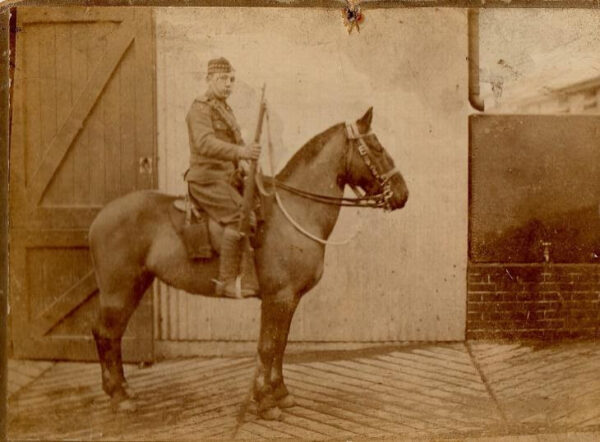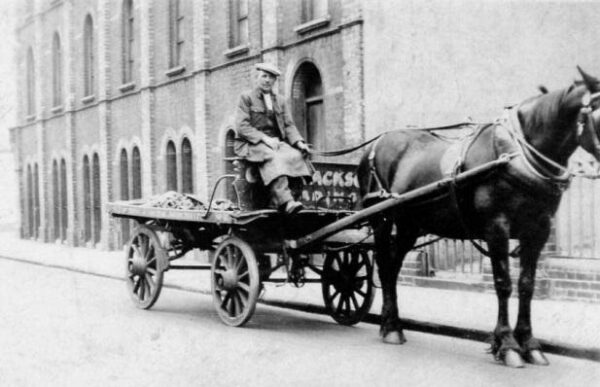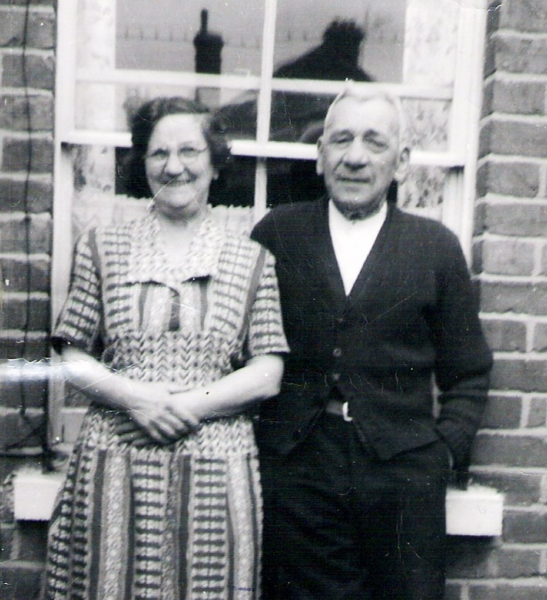My grandad, George Barnard Smith, was born in Chatham Street, Reading in 1885. Nothing is known of his boyhood apart from his attendance at Oxford Road school and having a lifelong love of horses. At 15 he was already working as a general carrier/carter delivering and collecting provisions and by the age of 25 he was lodged at the Green Tree pub in Wallingford where, in the 1911 census, he was employed as a servant/carman, again delivering beer by horse and cart.
In 1903 he had joined the Royal Scots Fusiliers, then a cavalry regiment, on furlough, pending transfer to the Army Reserve in 1905, while continuing at his day job of a carter. His length of service in the regular army seems to have started the same day as his service in the army reserve ended in 1911, so he probably threw in his day job at the Wallingford pub as his papers stated he was “with the colours”.

By 1914 the Royal Scots Fusiliers 1st battalion had become an infantry battalion and it is with this unit that he obtained the rank of corporal as a foot soldier. He was mobilised for war and landed at Le Havre, France in August 1914 and was engaged in various battles and skirmishes until March 1915. In one of these battles George suffered a shrapnel wound to his right arm and returned to England on March 6th of that year where we believe he spent time recuperating at the Devonshire Hospital, Buxton, Staffordshire. He then returned to Reading to marry my nan, Viola, in May of that year. George returned to the front line in France in July where he suffered the loss of one of his eyes in the Actions of St.Eloi Craters, April 1916 (a local operation in the Ypres Salient of Flanders) and was discharged with honour from the army in June of that year.
Up until now his life had followed the path of millions of others, but after his discharge he found himself considered an invalid and also unemployed with no trade to speak of, married and soon to become a father to their first daughter, my aunt.
From now on this is how my mum roughly related to me what we know of grandad’s life until he found employment, as he never, like many men, talked much about his war experiences, or his boxing and gambling exploits. He liked a pint in moderation and his regular haunts were The Alfred’s Head in Chatham Street and The Star in Duke Street, Reading, where nearly broke, he would normally win a free pint from the card games he learnt in the army. George possessed a crown and anchor board, similar to the card game pontoon, and if you were the banker, which he was, the percentages of winning most of the money were high. He was also very good at darts and other pub games. The other string to his bow was that he also learnt organised boxing in the army. Bare knuckle boxing (pugilism) had always been prevalent in the UK since the beginning of the 18th century but it was also illegal, with large purses offered on the big fights in front of thousands in pre-arranged fields and commons secretly arranged. These fights made many pugilists rich and famous household names throughout the land. At a local level in places like Reading it was totally different as local men fought down back alleys, pub courtyards or pub back rooms for a few silver coins collected at ringside or for a leg of meat, in front of a handful of pub regulars. The Star had a side alley and The Alfred’s Head, we think, had a courtyard and George soon caught on with the idea of using his boxing skills for extra money, especially as these were two of his two local drinking holes. Nothing is known of the men he fought, or where, and no records of how many fights he had were kept, but with the cards and boxing he managed to keep his family just above water financially. He fought with one eye, however he wore a glass eye the rest of the time which we believe was supplied by the army and changed at regular intervals as the colour matching his good eye faded after a few years.

My mother was born in 1922 and we understand by then George was employed at Jackson’s scrap metal merchants in Oxford Road, Reading. He was back on a horse and cart again, this time collecting the scrap metal until just before the Second World War, when the company changed from horse drawn transport to lorries. George never learnt to drive, but became a lorry driver’s mate at the company where he stayed until his retirement in 1950. At home he was a wonderful and typical grandfather to my sister and me in the 1950’s when we were children and visited regularly, sometimes staying the weekend. He showed us all the card games (and tricks) that he knew, dice games, made us a bagatelle board and played a game with us flicking cigarette cards against a wall. He always took his glass eye out for meals because it aggravated his jaw

while eating. However it didn’t stop him now and again using a glass of water at meal times, stirring the water with his fork, quietly slipping the eye out, dropping it in the glass and watching my sister and me looking in horror as the eye went around and around in the current! He also rescued a pure black feral cat which he called Smut and he was the only one who could handle him, anyone else who got too close to Smut when sat on his favourite chair was met with spitting and hissing and yet George could stroke and play with him.
Grandad died in 1962 aged 76 in the house he bought with nan in 1915 in Queen’s Cottages, Reading, and where he lived all his married life. To us all he was a man who was larger than life and they don’t make them like him anymore.
